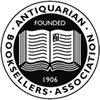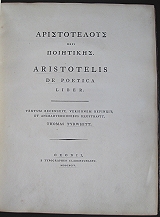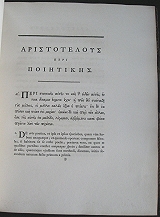
MAPS & VIEWS
PRINTS
BOOKS
back to search results place the mouse over an image to zoom
Tyrwhitt's Rrecension of Aristotle's Poetics.
Aristotle. Tyrwhitt, Thomas editor ΑΡΙΣΤΟΤΕΛΟΥΣ ΠΕΡΙ ΠΙΗΤΙΚΗΣ. Aristotelis De poetica liber : Græce et Latine. / Lectionem constituit, versionem refinxit, animadversionibus illustravit Thomas Tyrwhitt. Oxonii/Oxford E Typographeo Clarendoniano. 1794Large paper Octavo; xvi, 257, [3] p. engraved tail pieces.
The beautiful clear Greek text printed with the Latin translation below followed by the commentary by Tyrwhitt.
First edition of the outstanding recension by Thomas Tyrwhitt (1730-1786). "His Poetics was the first modern edition of the text." (Barker)
Graesse: "édition estimée".Brunet " Belle édition.."
"This is a very elegant and accurate edition, containing the commentaries of Tyrwhitt, as well as his version ... The Greek text is formed on that of Winstanley, but so carefully corrected, as to leave not a single error unnoticed ... The large paper copies of this volume form one of the most attractive ornaments of a classical collection. They are few in number, and costly in price; being reserved by the Delegates of the University Press as presents for eminent characters. I understand that 34 copies have been already distributed ... This edition has been several times reprinted at Oxford, with only three alterations, and those not important ones." Dibdin I, 323 Rebacked, original boards diced calf with Greek key in gilt; marbled endpapers. Old ink annotation to front free end paper quoting Dibden; owners name clipped.
Large paper copy clean and bright.
Aristotle's Poetics is the earliest surviving work of dramatic theory and first extant philosophical treatise to focus on literary theory in the West. This has been the traditional view for centuries. However, recent work is now challenging whether Aristotle focuses on literary theory per se (given that not one poem exists in the treatise) or whether he focuses instead on dramatic musical theory that only has language as one of the elements.
In it, Aristotle offers an account of what he calls "poetry" (a term which in Greek literally means "making" and in this context includes drama – comedy, tragedy, and the satyr play – as well as lyric poetry and epic poetry).
They are similar in the fact that they are all imitations but different in the three ways that Aristotle describes:
Differences in music rhythm, harmony, meter and melody.
Difference of goodness in the characters.
Difference in how the narrative is presented: telling a story or acting it out.
In examining its "first principles", Aristotle finds two: 1) imitation and 2) genres and other concepts by which that of truth is applied/revealed in the poesis. His analysis of tragedy constitutes the core of the discussion.
The work was lost to the Western world for a long time. It was available in the Middle Ages and early Renaissance only through a Latin translation of an Arabic version written by Averroes.
TYRWHITT, THOMAS (1730-1786), English classical scholar and critic,
was born in London on the 27th of March 1730, where he died on the 15th of August 1786. He was educated at Eton and Queen's College, Oxford (fellow of Merton, 1755). In 1756 he was appointed under-secretary at war, in 1762 clerk of the House of Commons. In 1768 he resigned his post, and spent the remainder of his life in learned retirement. In 1784 he was elected a trustee of the British Museum, to which he bequeathed a portion of his valuable library.
His principal classical works are: Fragmenta Plutarchi II. inedita (!773). from a Harleian MS. ; Dissertatio de Babrio (1776), containing some fables of Aesop, hitherto unedited, from a Bodleian MS.; the pseudo-Orphic De lapidibus (1781), which he assigned to the age of Constantius; Conjecturae in Strabonem (1783); Isaeus De Meneclis hereditate (1785); Aristotle's Poetica, his most important work, published after his death under the superintendence of Dr Burgess, bishop of Salisbury, in 1794. Special mention is due of his editions of Chaucer's Canterbury Tales (1775-1778); and of Poems, supposed to liave been written at Bristol by Thomas Rowley and others in the Fifteenth Century (1777-1778), with an appendix to prove that the poems were all the work of Chatterton. In 1782 he published a Vindication of the Appendix in reply to the arguments of those who maintained the genuineness of the poems. While clerk of the House of Commons he edited Proceedings and Debates of the House of Commons, 1620-1621 from the original MS. in the library of Queen's College, Oxford, and Henry Elsynge's (1598- 1654) The Manner of holding Parliaments in England.[ 1911 Encyclopædia Britannica, Volume 27]
Brunet 1:478; Graesse I,214 ;Barker, Oxford Univ. Press 167. - Dibdin I, 323. 300 by 240mm (11¾ by 9½ inches). ref: 3080 €900
Company: Bryan, Mary Louise.
Address: Ag. Andrianoy 92 , 21 100 Nafplio, Greece.
Vat No: EL 119092581







